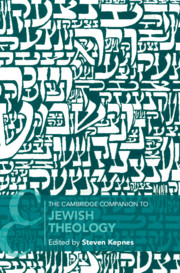Book contents
- The Cambridge Companion to JEWISH THEOLOGY
- cambridge companions to religion
- the cambridge companion to JEWISH THEOLOGY
- Copyright page
- Contents
- Notes on Contributors
- Acknowledgements
- 1 Introduction
- 2 What is Jewish Theology?
- Part I Biblical-Rabbinic
- 3 Jewish Biblical Theology
- 4 The God of the Rabbis
- 5 The Theology of the Daily Liturgy
- Part II Medieval
- Part III Modern
- Part IV Contemporary Issues
- Part V Analytic Philosophy and Theology
- Index
- Other Titles in the Series (continued from page ii)
- References
3 - Jewish Biblical Theology
from Part I - Biblical-Rabbinic
Published online by Cambridge University Press: 03 December 2020
- The Cambridge Companion to JEWISH THEOLOGY
- cambridge companions to religion
- the cambridge companion to JEWISH THEOLOGY
- Copyright page
- Contents
- Notes on Contributors
- Acknowledgements
- 1 Introduction
- 2 What is Jewish Theology?
- Part I Biblical-Rabbinic
- 3 Jewish Biblical Theology
- 4 The God of the Rabbis
- 5 The Theology of the Daily Liturgy
- Part II Medieval
- Part III Modern
- Part IV Contemporary Issues
- Part V Analytic Philosophy and Theology
- Index
- Other Titles in the Series (continued from page ii)
- References
Summary
Biblical theology is the systematic theological interpretation of the Bible, and Jewish biblical theology is the systematic theological interpretation of the Jewish Bible (Tanak). The Jewish Bible appears in its uniquely distinctive form as the Tanak, which enables the Jewish Bible to function as the essential and foundational work of Jewish thought and practice. In order to provide an overview of Jewish biblical theology, this essay treats several fundamental concerns, viz., the unique form of the Jewish Bible in contrast to the distinctive forms of the Christian Bible; the dialogical character of the Jewish Bible in relation to itself and to the larger context of Jewish thought; the eternal covenant between G-d and the Jewish people; the construction of the Jewish people and its institutions, such as the land of Israel, the holy Temple, and the monarchy; and the problem of evil, particularly the exile and potential destruction of the Jewish people, that calls the eternal covenant between G-d and Israel into question.
- Type
- Chapter
- Information
- The Cambridge Companion to Jewish Theology , pp. 41 - 59Publisher: Cambridge University PressPrint publication year: 2020

